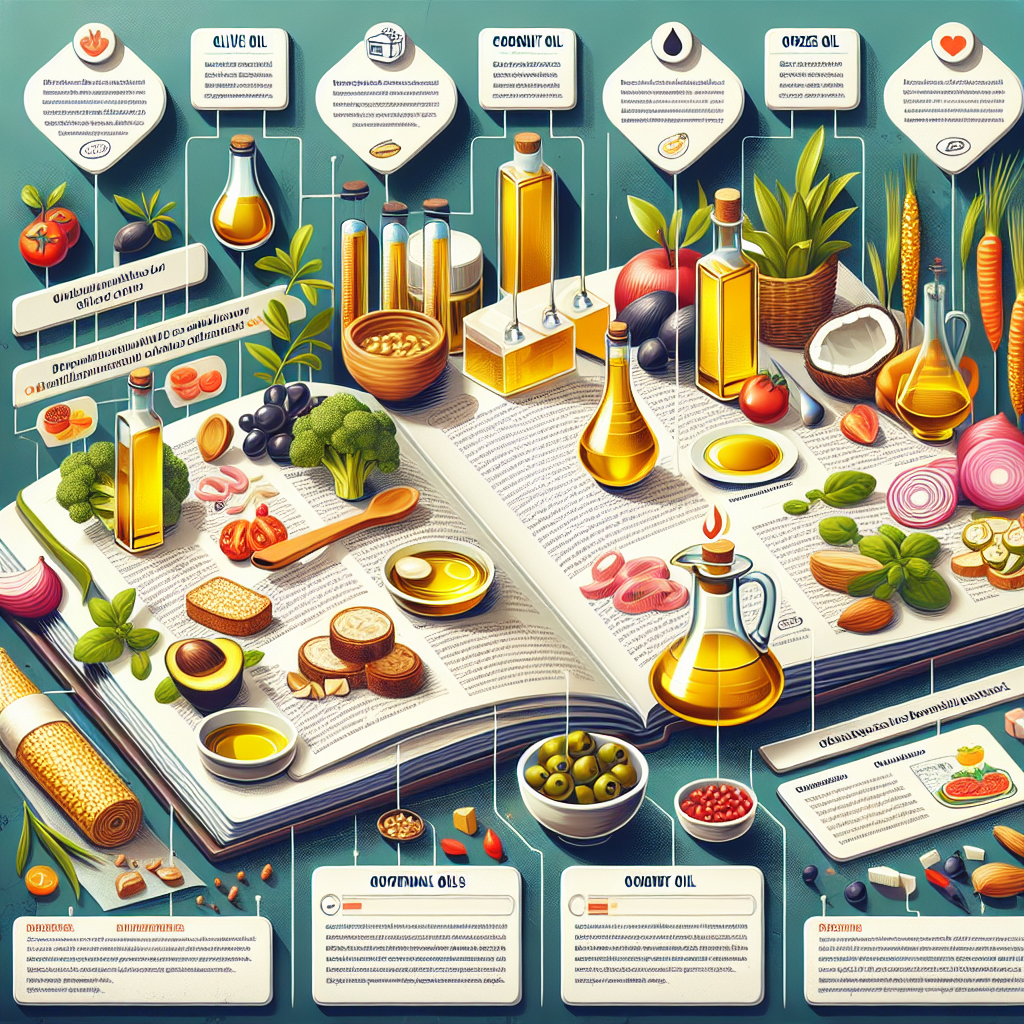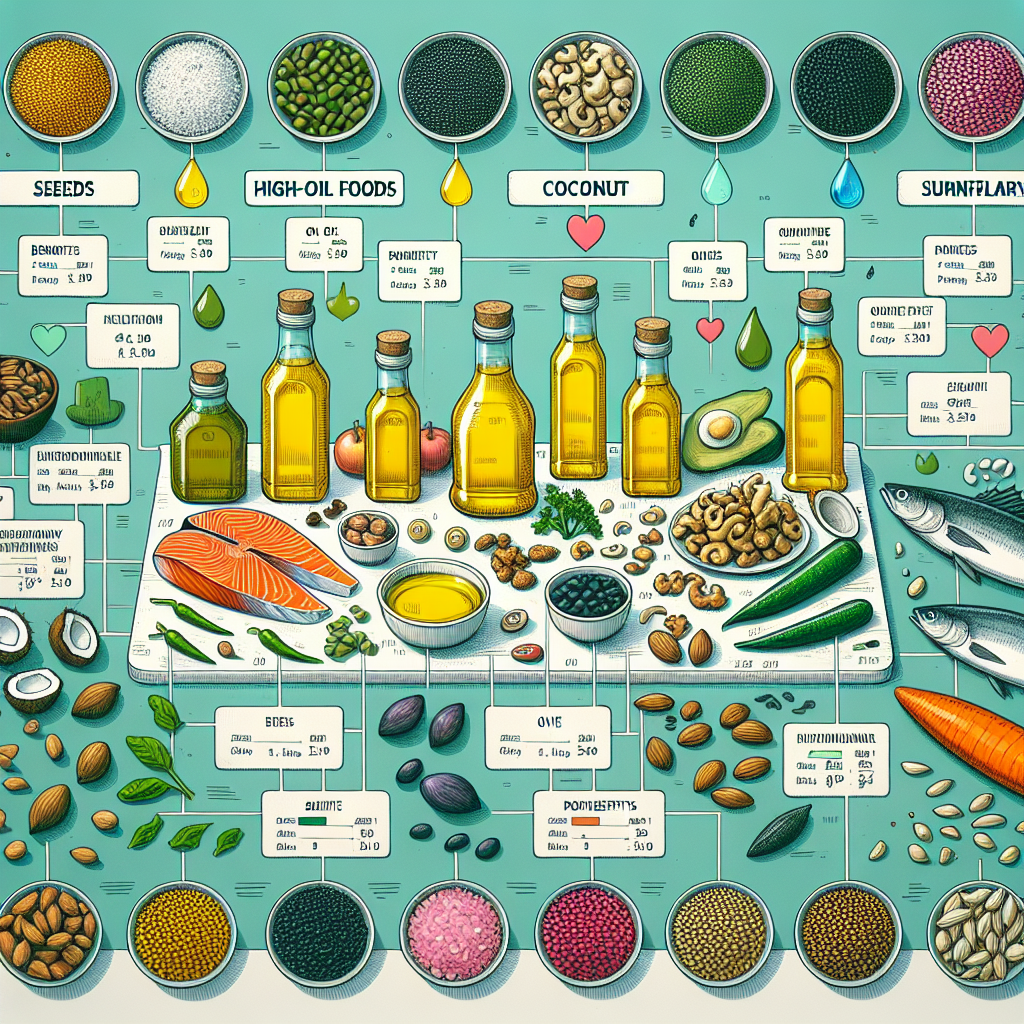Have you ever wondered what foods are packed with beneficial oils? Look no further! In this article, we will explore four incredible foods that are rich sources of healthy oils. From the versatile avocado to the mighty salmon, you’ll discover a range of options to incorporate into your diet for a boost of essential fats. Get ready to tantalize your taste buds and nourish your body with these top high-oil foods!

Avocado
Nutritional profile
Avocados are not just delicious and creamy, but they are also packed with important nutrients. These green gems are an excellent source of healthy fats, containing predominantly monounsaturated fats, which are known to promote heart health. They are also rich in fiber, potassium, vitamin K, vitamin C, vitamin E, and B vitamins such as folate.
Health benefits
Incorporating avocados into your diet can provide numerous health benefits. The monounsaturated fats found in avocados can help lower bad cholesterol levels and reduce the risk of heart disease. The high fiber content aids digestion and promotes a healthy gut. Avocados also contain antioxidants that can reduce inflammation in the body and help prevent chronic diseases. They are also a good source of vitamin E, which supports healthy skin and hair.
How to incorporate into your diet
Avocados are incredibly versatile and can be enjoyed in many different ways. You can simply slice them and add them to salads, sandwiches, or wraps for a creamy and nutritious addition. They can also be mashed and spread onto toast as a healthy alternative to butter. Avocado can be blended into smoothies or used as a base for homemade salad dressings. So, give in to your avocado cravings and enjoy their deliciousness while nourishing your body!
Olive oil
Different types of olive oil
Olive oil is a well-renowned culinary companion that is available in various types, each with its distinct characteristics and properties. Extra virgin olive oil is the highest quality and most flavorful option, as it is made from the first pressing of the olives. It has a distinctive fruity taste and is rich in antioxidants. Virgin olive oil, on the other hand, is slightly less flavorful and has a higher acidity level. Light olive oil, despite its name, is not lower in calories but rather has a milder taste, making it suitable for baking or cooking at high temperatures.
Benefits of olive oil
Olive oil is a staple in the Mediterranean diet, known for its numerous health benefits. It is packed with heart-healthy monounsaturated fats that can help lower bad cholesterol levels and reduce the risk of heart disease. Olive oil is also rich in antioxidants, such as vitamin E, which can protect cells from damage caused by free radicals. Additionally, it contains anti-inflammatory properties that may help reduce the risk of chronic diseases, such as arthritis and certain types of cancer.
Cooking with olive oil
Olive oil is a versatile cooking oil that can be used in a variety of dishes. It can be used for sautéing vegetables, frying, roasting, or even as a base for salad dressings and marinades. Its rich flavor can enhance the taste of your favorite dishes, adding a distinct Mediterranean touch. However, it’s important to note that olive oil has a relatively low smoke point, so it’s best to avoid using it for deep-frying or cooking at very high temperatures.

Salmon
Omega-3 fatty acids in salmon
Salmon is a fatty fish that is highly regarded for its abundance of omega-3 fatty acids. Omega-3 fatty acids are essential fats that our bodies cannot produce on their own, so it’s important to obtain them through our diets. These fatty acids, particularly EPA (eicosapentaenoic acid) and DHA (docosahexaenoic acid), have been linked to numerous health benefits, including improved heart health, reduced inflammation, enhanced brain function, and even potential mood regulation.
Health benefits of salmon
Incorporating salmon into your diet can provide a wide range of health benefits. The omega-3 fatty acids found in salmon have been shown to help reduce the risk of heart disease by lowering blood pressure, triglyceride levels, and inflammation. They also support brain health and may help reduce the risk of cognitive decline and mood disorders. Salmon is also an excellent source of high-quality protein, vitamins, and minerals, such as vitamin D, vitamin B12, selenium, and potassium.
Ways to prepare and enjoy salmon
Salmon can be prepared in various delicious ways to suit your taste preferences. You can grill or bake it with a squeeze of lemon juice and a sprinkle of herbs for a simple yet flavorful dish. Another popular method is pan-searing the salmon to achieve a crispy outer layer while retaining its tender and juicy texture inside. Alternatively, you can incorporate flaked salmon into salads, pastas, or sandwiches for a protein-packed meal. With its versatility, there are endless possibilities for enjoying salmon and reaping its incredible health benefits.
Coconut oil
Composition of coconut oil
Coconut oil is derived from the meat of mature coconuts and is unique in its composition. It is composed mainly of saturated fats, which gives it a solid form at room temperature. While coconut oil has been criticized for its saturated fat content, it is important to note that not all saturated fats are created equal. The predominant saturated fat in coconut oil is lauric acid, which has been found to increase levels of good cholesterol and promote heart health.
Health benefits of coconut oil
Despite its high saturated fat content, coconut oil offers several potential health benefits. The medium-chain triglycerides (MCTs) present in coconut oil are believed to have antimicrobial and anti-inflammatory properties, supporting a healthy immune system. Furthermore, coconut oil has been associated with improved brain function and may help with memory retention and cognitive performance. It may also aid in weight management by increasing satiety and boosting metabolism.
Cooking and baking with coconut oil
Coconut oil’s unique flavor and aroma make it a popular choice for cooking and baking. It can be used as a substitute for butter or traditional cooking oils in many recipes. Coconut oil works well in both sweet and savory dishes, adding a subtle tropical flavor. It is particularly prized for its high smoke point, making it suitable for high-heat cooking methods like frying and roasting. So, whether you’re sautéing vegetables, making stir-fries, or creating delectable baked goods, coconut oil can add a delicious twist to your culinary creations.

Nuts and seeds
Almonds
Almonds are a powerhouse of nutrition, packed with essential vitamins, minerals, healthy fats, and antioxidants. They are an excellent source of vitamin E, magnesium, and fiber. Almonds have also been associated with several health benefits, including improved heart health, reduced cholesterol levels, and potential weight management. They make for a convenient and satisfying snack on their own, or they can be added to salads, stir-fries, or baked goods for an extra crunch.
Chia seeds
Chia seeds may be small, but they are mighty in terms of nutritional value. They are rich in fiber, omega-3 fatty acids, protein, and various minerals. Chia seeds have gained popularity for their ability to absorb liquid and form a gel-like consistency, making them a versatile ingredient in recipes. They can be used to thicken smoothies, create pudding-like desserts, or even be used as an egg substitute in vegan baking.
Walnuts
Walnuts are not only delicious but also a fantastic source of healthy fats, particularly omega-3 fatty acids. These powerful nuts are also rich in antioxidants, fiber, and other nutrients. Consuming walnuts has been linked to improved heart health, reduced inflammation, and even enhanced brain function. Whether enjoyed as a snack, added to baked goods, or sprinkled over salads, walnuts offer a delightful and nutritious addition to your diet.
Flaxseeds
Flaxseeds are a plant-based source of omega-3 fatty acids, lignans, and fiber. They are known for their potential to support heart health, reduce cholesterol levels, and improve digestive health. Ground flaxseeds are easier for the body to digest and absorb the nutrients they offer. You can sprinkle them on oatmeal, yogurt, or salad, or use them as an egg substitute in baking recipes.
Peanuts
Peanuts are a popular legume with a delicious flavor and a wide range of health benefits. They are an excellent source of plant-based protein, healthy fats, vitamins, and minerals. Peanuts have been associated with improved heart health, reduced risk of certain diseases, and even potential weight management. Whether eaten as a snack, incorporated into stir-fries, or transformed into homemade peanut butter, peanuts contribute to a balanced and nutritious diet.
Sardines
Nutritional value of sardines
Sardines are small, oily fish that are extremely nutrient-dense. They are an excellent source of omega-3 fatty acids, vitamin D, vitamin B12, calcium, and other essential nutrients. Sardines also provide high-quality protein and are low in mercury, making them a safe and sustainable seafood option.
Health benefits of sardines
Incorporating sardines into your diet can offer numerous health benefits. The omega-3 fatty acids found in sardines have been linked to a reduced risk of heart disease, improved brain function, and decreased inflammation. The calcium and vitamin D content promote bone health and may help reduce the risk of osteoporosis. Sardines are also a good source of protein, which supports muscle growth and repair.
Incorporating sardines into your diet
Sardines can be enjoyed in various ways, depending on your preferences. They can be eaten fresh, grilled, or canned. Canned sardines are convenient and can be added to salads, pasta dishes, or spread over whole-grain bread for a quick and healthy sandwich. Fresh sardines can be marinated and grilled for a flavorful main course. With their rich flavor and impressive nutritional profile, sardines are definitely worth considering as a regular addition to your diet.

Dark chocolate
Cocoa content in dark chocolate
Dark chocolate is a treat that not only satisfies your sweet tooth but also offers potential health benefits. The cocoa content in dark chocolate is what sets it apart from its milk chocolate counterpart. The higher the cocoa content, the more potential health benefits it may provide. Opting for dark chocolate with a high percentage of cocoa ensures a greater concentration of antioxidants and less added sugar.
Antioxidants in dark chocolate
Dark chocolate is rich in antioxidants, specifically flavonoids, which have been associated with various health benefits. These antioxidants help protect cells from damage caused by free radicals, potentially reducing the risk of chronic diseases such as heart disease and certain types of cancer. Additionally, dark chocolate has been linked to improved blood flow and reduced blood pressure.
Enjoying dark chocolate in moderation
While dark chocolate can offer potential health benefits, it’s important to enjoy it in moderation due to its calorie and fat content. Aim for a small portion, such as a few squares or a small piece, and savor each bite. Dark chocolate can be enjoyed on its own as a satisfying treat, or it can be incorporated into recipes such as homemade energy balls, baked goods, or melted as a dip for fresh fruits. Remember, moderation is key to maximize the benefits while keeping your overall diet balanced.
Peanut butter
Nutritional value of peanut butter
Peanut butter is a beloved spread that is not only delicious but also packed with nutrients. It is a great source of plant-based protein, healthy fats, vitamins, and minerals. Peanut butter also contains fiber and antioxidants. However, it’s important to choose natural peanut butter without added sugars or unhealthy additives.
Health benefits of peanut butter
Incorporating peanut butter into your diet can offer numerous health benefits. The combination of protein and healthy fats in peanut butter helps keep you feeling full and satisfied, making it a great addition to meals or snacks. The monounsaturated fats present in peanut butter can promote heart health by reducing bad cholesterol levels. Peanut butter also provides important nutrients like vitamin E, magnesium, and potassium.
Ideas for using peanut butter in meals
Peanut butter can be enjoyed in a variety of ways beyond simply spreading it on bread. It can be added to smoothies for a creamy and nutty flavor, used as a dip for fresh fruits or vegetables, or incorporated into sauces for a savory twist. Peanut butter can also be used in baking recipes, such as cookies, brownies, or energy bars. Get creative and experiment with different combinations to discover your favorite way to enjoy the versatility of peanut butter.

Sesame oil
Rich in unsaturated fats
Sesame oil is a flavorful oil derived from sesame seeds and is commonly used in Asian cuisine. It is predominantly composed of unsaturated fats, which are considered heart-healthy fats. These fats can help lower bad cholesterol levels and reduce the risk of heart disease when consumed as part of a balanced diet.
Flavor and aroma of sesame oil
Sesame oil has a distinctive nutty flavor and aroma that adds depth and richness to dishes. It is often used as a finishing oil, drizzled over stir-fries, rice dishes, or even salads to enhance the overall taste experience. The roasted variety of sesame oil has a stronger flavor and is commonly used in sauces and marinades.
Using sesame oil in cooking and dressings
Sesame oil is valued not only for its flavor but also for its high smoke point, making it suitable for stir-frying and deep-frying. It can also be used as a cooking and seasoning oil in various Asian-inspired dishes. In salad dressings, sesame oil can be combined with other ingredients like soy sauce, vinegar, and ginger to create a delicious and aromatic dressing. Just a drizzle of sesame oil can elevate the flavor of your dishes and add a delightful twist.
Sunflower oil
Omega-6 fatty acids in sunflower oil
Sunflower oil is a widely used cooking oil that is rich in omega-6 fatty acids. While omega-6 fatty acids are essential for the body, it is important to maintain a proper balance between omega-6 and omega-3 fatty acids. Most Western diets tend to be higher in omega-6 fats, so it’s crucial to consume them in moderation and ensure a good intake of omega-3 fats as well.
Benefits and uses of sunflower oil
Sunflower oil is a versatile oil that can be used for various cooking methods, including sautéing, frying, and baking. It has a relatively high smoke point, making it suitable for cooking at higher temperatures. Sunflower oil is also known for its neutral flavor, making it a great choice for dishes where you want the other ingredients to shine. Additionally, sunflower oil is a good source of vitamin E, an antioxidant that plays a crucial role in protecting the body’s cells from damage.
Considerations and usage tips
While sunflower oil offers certain benefits, it is important to use it in moderation due to its omega-6 fatty acid content. As mentioned earlier, maintaining a proper balance between omega-6 and omega-3 fatty acids is essential for overall health. It’s also recommended to choose high-quality, cold-pressed sunflower oil to ensure the retention of its nutritional properties. Like any cooking oil, storing sunflower oil in a cool, dark place and avoiding prolonged exposure to heat or light will help maintain its quality.
Incorporating high-oil foods into your diet can provide a multitude of health benefits and add delightful flavors to your meals. From the creamy goodness of avocado to the rich taste of dark chocolate, there is something for everyone. So, embrace these nutritious options and explore the countless ways to enjoy the goodness of oils in your everyday cooking and snacking.

